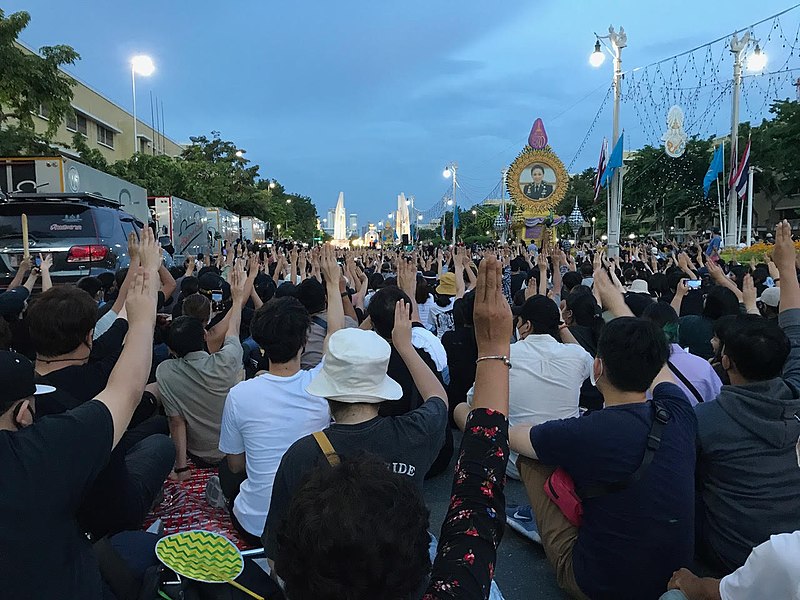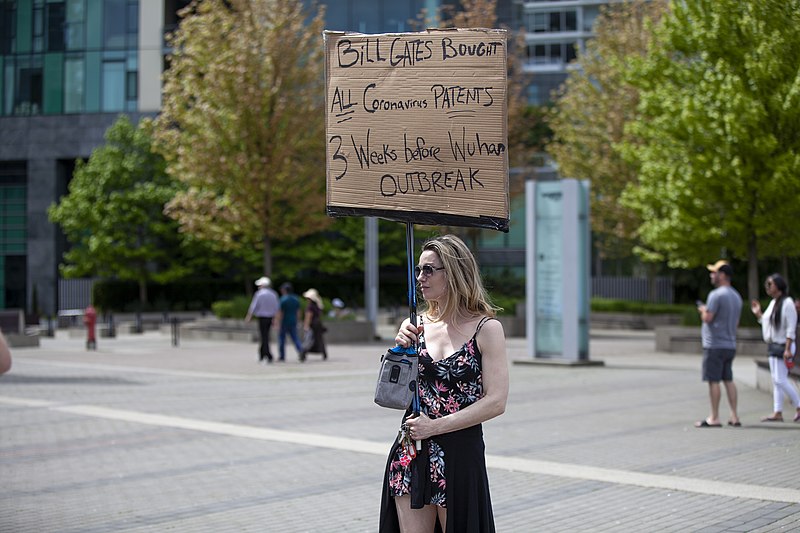Interviews with Tina Lee (TL), Kate O’Neil (KON), and James Ziegler (JZ)
Could you please briefly introduce yourself?
TL: I’m Tina Lee, a writer, researcher, and project manager in Berlin. I’m registered to vote in Virginia.
KON: I’m a socialist from the US, active on the American Left for many years, and have lived and worked as a teacher in London, UK since 2012. I’m a contributor to Counterfire on US-American politics.
JZ: My name is James Zeigler. I am a member of marx21 (US), and resident of Pasadena, CA and past resident of Portland, OR.
At the time of the first interview, a Trump victory still seemed possible. Now it seems that Biden has won a clear majority. What is your reaction?
JZ: I was actually not surprised to see Trump on the verge of what looked like another election day victory. I was surprised to see that Biden had been able to flip PA, MN, MI, and GA from 2016 Trump wins over Hillary. I am, however, not surprised it was close— but am very surprised by the increased voter turnout for both candidates. I do not think we can extrapolate much from the increased turn-out other than that this election cycle is far more politically charged, and I think the mail-in option made a difference with turn-out.
Do you think that Trump will go gracefully?
TL: HA.
JZ: He is incapable of grace. Humility is not something he has ever shown.
There were some nasty right-wing demos in Washington and elsewhere. Who organised these demos, and what are they doing now?
JZ: Mostly Proud Boys, or other ‘Patriot’ groups like ‘Patriot Prayer’, and I am sure other Nationalist groups and the White Supremacist fringe that will get involved There are plenty of militia groups (3 percenters) that will also get involved, usually seen in military grade body armour and weaponry.
Isn’t it now time to scrap the Electoral College system?
TL: Yes! And introduce a raft of other voting reforms, and ban gerrymandering, and fight for statehood for DC and Puerto Rico. Let’s fight on many fronts.
JZ: It’s been time for quite awhile. I doubt that it will go away any time soon. It has been the symbolic equaliser for ‘Rural America’ vs the evil ‘City Slickers’ (Liberals). The fight over keeping this system of minority control has been viewed as absolutely necessary to protect classic ‘American Values’ (Conservatism, Heartland, Christian Values, etc).
What can we expect of a Biden/Harris government?
JZ: A less verbally offensive version of Trump politics. They literally have no choice because Biden and Harris are 100% dedicated to bi-partisan politics, because the Democrats lost in both the House and Senate. Unless they want to get nothing done, they must draft right-leaning legislation, which will help further pave the way to Trump 2.0 (either Trump or potentially his son’s running in 2024).
TL: People often haven’t read Biden’s manifesto and don’t realise that he has the most progressive platform of any president in US history — far to the left of either Obama administration on issues such as immigration reform, environment, and criminal justice. Considering what has come before that certainly doesn’t make him a socialist, but it means there are some real possibilities for progress if he doesn’t face massive gridlock and follows through with what he promises. We will have to wait for Senate run-offs in Georgia to assess more properly.
But what I expect initially is a slate of executive orders overturning the Muslim Ban, reinstating DACA (the Dream Act), and restoring environmental standards to where they were pre-Trump. I am looking forward to this while being realistically pessimistic about the massive entrenched challenges facing this administration and their own tendency to side with centrists. I’m not assuming the worst before they even start, though, because whether it’s right or left, it’s best to look at what people actually do, not what they say.
KON: An attempt to move politics back to a pre-Trump, Obama-style centre. This was clearly the party leadership’s goal in side-lining Sanders during the primary, and it was further evidenced by the support they welcomed from Wall Street and Bush-era hawks during the campaign and of Washington insiders for cabinet roles after the election. Internationally, this will mean a recommitment to organisations and agreements that Trump has snubbed, such the WHO, NATO, and the Paris climate accords, and an overturning of the Muslim travel ban. Biden has also signalled his wishes to re-join the Iraq nuclear deal, although recent tensions with Iran over the assassination of their lead nuclear scientist may complicate this.
Domestically, scientific agencies like the Centres for Disease Control and the Environmental Protection Agency will be re-legitimised; commissions will be set up to address social issues like police abuse and separation of immigrant families; and some limited ‘pathway to citizenship’ for undocumented immigrants begun under Obama will be renewed. Most of this can be done through executive order. We are also certain to see some emergency action on COVID, such as one-off economic relief measures, tighter social distancing restrictions and funding for treatment and vaccination. It won’t be hard to improve on Trump’s performance in this area, though. He just seems to close his eyes, plug his ears and sing ‘Happy Birthday’ as the virus spins out of control.
Beyond this, those looking for a departure from status quo capitalist management are sure to be deeply disappointed. The few progressive reforms that Biden has pledged to put on the table in 2021—a 7% tax hike on corporations, the addition of a ‘public option’ to Obama’s healthcare reforms, a $2 trillion fund for clean energy development, and the creation of 5 million jobs through a $700 billion economic boost—will all undoubtedly be blocked or whittled down by Republicans in Congress, regardless of the outcome of the Georgia senate race in January. Even if they were to pass in full, they are far narrower in scope than Sanders’ Green New Deal or Medicare for All plans and rely essentially on private sector investment.
But this moderate brand of politics cannot resolve the deep crisis country is facing. Whatever the intentions, the Biden administration will be operating under conditions very different from those of the Obama administration. Transformative economic, health, and climate change is required, and the less Biden is willing or able to issue from White House, the more politics will need to fought over between right and left in the streets.
In 2020, one of the most discussed political slogans was “Defund the Police”. Could this demand be realised (and how)?
TL: Despite all the hand-ringing over the phrasing, the slogan accomplished a lot: it moved the Overton window on police reform, drew attention to police budgets, and started a conversation about alternatives to the carceral state. A huge majority of Americans support divesting funds to the police to invest in social programs – which is what #defundthepolice stands for. Abolitionists should build on this momentum and continue to stack up victories for community-led solutions and alternatives to sending our taxpayer dollars to increasingly militarised police departments that don’t make communities safer.
JZ: Not under a Biden/Harris presidency. Both are staunch supporters of police; Harris is a cop, and her CA record should illustrate her absolute support of more cops, more jails. I think there will be some states where there will be token shows of de-funding, or of restructuring police budgets in ‘Liberal’ states, but because these changes will be debated over and end up completely watered-down versions of real change. Any changes will prove to be ineffective, and instead of identifying the poor implementation, they will blame ‘socialistic’ type programs that prove the failures of socialism and scrap the entire project and blame us.
Since the death of Ruth Bader Ginsburg, there are worries the new Supreme Court could ban all abortions. How likely a scenario is this?
TL: It is not likely that SCOTUS bans abortion. Instead, it seems possible that they could overturn Roe v. Wade, a case that said women have the right to an abortion without excessive government regulation. With that case revoked, we can expect to see a flurry of fascist state laws regulating women’s bodies. However, it is still possible to make state-level laws that enshrine a woman’s right to choose, or for state level courts or constitutions to do so. So, the Supreme Court won’t likely ban abortion, but it may open the floodgates for states to do so.
KON: What is at stake here is whether or not the court will overturn the Roe v. Wade decision of 1973, which gives constitutional protection to abortion in all fifty states. So overturning it would not ban abortion nationally, but it would grant the right to ban it at the state level. A majority of Americans has consistently opposed a blanket ban on abortions since Roe v. Wade, and you can be sure that in more liberal states the extent of support for the right to choose is very high. So if Roe v. Wade is overturned, what we would be looking at is an unequal patchwork system in which women in some states have access and others do not.
This is still a nightmare scenario, of course. It would set the women’s movement back generations, and it is a distinct possibility. Currently there are over a dozen abortion-related cases just one step away from a Supreme Court, and with the confirmation of Amy Coney Barrett, six out of nine justices are now conservative. It is likely that one of these cases will come up soon, and women’s rights activists must remain on high alert and prepare to ‘go Polish’ when it does.
But I don’t think it’s the case that Roe v. Wade will be overturned ‘automatically’, as Trump claimed in 2016, just because conservatives stack the court. Republican appointees have been the majority on the Court for 49 of the past fifty years, and Roe v. Wade was in fact decided by a Court with the same ratio of conservatives and liberals that it has now, 6-3, during the reign of Richard Nixon. These people opposed abortion, but they were also responding to popular opinion and the women’s rights movement of the early seventies.
This summer, the Court, which already had a 5-4 conservative majority, struck down a challenge to Roe v. Wade coming from Louisiana. Why? 2019 saw waves of protests across the country when first-trimester abortion bans were declared in various states. I think the Court has been hesitant to go for the jugular on abortion all these years because, ultimately, they fear unleashing a national ‘Women’s Lives Matter’ movement and a major political crisis. For this reason, rather than trying to overturn Roe v. Wade, the Court may choose to continue kicking the issue back to the states, where rights have been quietly chipped away since 1973 and where smaller local movements are easier to trample. Our movement must be just as prepared to confront that strategy.
Biden has made no secret of his imperial ambitions. Can we expect more wars under Biden?
JZ: Lots more, and he will sell it as ‘good for the failing economy’, which will still be failing but not for the ruling class.
TL: I think in the short term a US return to robust collective security organisations probably makes new outbreaks of wars somewhat less likely. But that won’t necessarily impact below the surface conflicts where the US and our horrible weapons continue to play a significant role.
What can we expect from Alexandria Ocasio-Cortez and the Squad?
TL: Unless she drops out of politics because of the relentless harassment, I think AOC is going to continue to be a major progressive force in the party, and the current squad will hopefully continue to grow. I think their success depends heavily on their ability to change the way dark money influences US politics. Warren and Sanders both had good approaches to dealing with that issue, and I hope they push for their strategies in the Biden administration.
JZ: I expect more of the same. Obviously much further left than the majority, but she and the Squad have shown the several contradictions they have politically with the DSA and the ‘Left’. They have limits, but I expect them to be the popular voice of dissent in the Senate and House.
The DSA had a strategy of building inside and outside parliament. What can we expect of them now that the elections are over?
JZ: I am not sure what sort of faith I have in the DSA. There are too many political contradictions within the organisation, and I am not sure they can actually be the vehicle to push politics leftwards in America because of the contradictory strategy. But maybe this sort of Big-Tent organisation can be effective in the struggle for socialism, but I am not sure how.
KON: There is a wide range of views in the DSA about how much weight to give parliamentary versus extra-parliamentary activity, and this reveals itself in debates about how to orient to the Democrats. Many, like Alexandra Ocasio Cortez, look to a strategy of reforming the Democratic Party and shifting it leftwards—very similar to that of the Corbyn-supporting Left inside of the British Labour Party. The priority is to get progressives elected to office and to leverage this to lobby for change through legislation.
Much of the DSA membership, led by the Bread and Roses faction and promoted in publications like Jacobin, have espoused an inside-outside strategy that they call ‘the dirty break’. That is, electoral campaigns on the Democratic ticket should continue to be a key area of activity until the political and organisational strength of DSA, and indeed class struggle, has developed to the point where they can form a separate party. In theory, this strategy should lend equal weight to grassroots organising and campaigning, but it has been argued that in practice ‘the dirty break’ has pushed movement and organisation building to the margins of DSA work. For example, while individual DSA members or local DSA branches have been very involved in the Black Lives Matter organising, DSA has not been a key player in the movement nationally. It is for this reason that a minority of DSA members, often around revolutionary left publications such as Tempest, are now pushing for a ‘clean break’ from the Democratic Party and a renewed emphasis on grassroots organising in workplaces and neighbourhoods.
For the foreseeable future, it looks like the Bread and Roses ‘dirty break’ position will hold the most sway over the membership, but that view could be put to the test quite dramatically in the coming year if Biden launches a direct attack on the Left in the Democratic Party, if politics is deadlocked in Washington, if further major class struggles do emerge. There is no guarantee, of course, that DSA will be capable of responding to these changes. One mustn’t forget that its transformative growth spurt took place in the wake of an electoral campaign, the Sanders’ 2016 presidential run, and electoralism has dominated the group’s leadership and activity ever since. A shift from this approach would have to be the subject of major debate inside DSA. I hope we will see this.
Does the left have a future in the Democratic Party? If not, what should it do?
TL: Yes, in fact it is the future of the Democratic Party.
JZ: No, and we should really stop trying. The work should be started to break labour away from the Democratic Party. Union Labour donations to the Democrats has been far eclipsed by Wall Street. The voice of Labour in American Politics has been effectively silenced since probably 1920-1930’s when the American Labour Movement sort of loses its effectiveness. Workers need to organise to either force their union to back and formulate a true American Labour Party, or to form new labour organisations that will work to back or form a Labour Party alternative. However, it must be only the political representative of the working class and not the path to socialism.
KON: If by this you mean, ‘Can the Democratic Party be transformed into a left-wing party?’, the answer is an emphatic no. There is no historical precedent for this. Since its founding as a party representing southern slaveowners in the eighteenth century, through to its conversion in the twentieth century to the party of choice for more liberal-minded capitalists, the Democrats have never been anything but an advocate for elite interests. This is obscured, of course, by the fact that the Party—at least since the Roosevelt era—has relied on votes from working-class and oppressed constituencies, and so must talk left at election time to gain votes. Institutions that routinely rally the vote for Democrats—from trade unions to civil rights groups—in turn echo and legitimise this left talk.
Until the Sanders campaign in 2016, it was the often case that grassroots activists from the ranks of these institutions would run for office themselves, furthering the impression that the party represented a left-wing agenda. But in the end these activists have generally ended up colouring within the moderate lines drawn by the party’s Wall Street backers. John Lewis, the recently deceased civil rights hero turned Democratic congressman, is a perfect example of this kind of progressive loyalist. A radical in the 1960s, he maintained his progressive credentials by defying the party leadership on a number of important occasions, including opposition to both Gulf Wars, NAFTA, Clinton’s regressive welfare reforms and the homophobic Defense of Marriage Act. But he has also played a key role in propping up the party’s neoliberal establishment. In 2016, he not only chose to back Clinton over Sanders for the presidential nomination, he even tried to discredit Sanders by claiming Sanders had exaggerated his involvement in the civil rights movement. He is also a staunch supporter of Israel and stood against the Black Lives Matter movement’s call to defend the police.
Since 2016, we have witnessed the emergence of a very different kind of progressive inside the Democratic Party: first with the Sanders campaign in 2016, then with the election to Congress of the Squad in 2018, and again this year with the election to Congress of other progressives, most famously Jamaal Bowman from New York and Cori Bush from Missouri. These figures look to grassroots struggles as an engine for social change; support transformative policies like the Green New Deal and Medicare for All; and—most crucially—are willing to stand up to party leadership on a host of controversial questions, such as defunding the police and support for Israel. This is very refreshing, but it will not fundamentally change the direction of the party.
My one hope is that these new progressives can at least caucus collectively and leverage their positions as a coherent voice inside Congress for left-wing movements on the ground. The pressure from inside the Democratic Party not to do this will be immense, though. To resist such pressures, grassroots movements will need to grow in size and strength, and the Squad and others will need to maintain close links with them. Meanwhile, the extra-parliamentary left will need to devote more resources to building the mass organisations and networks that can pose a left-wing alternative to the Democrats in the future. I would love to see inspiring fighters like Ilhan Omar, AOC, and Cori Bush at the helm of such a venture one day.
What are your wishes for 2021?
JZ: An end to the pandemic.
TL: To only hear the words ‘I think you’re muted, check your microphone?’ once a week instead of 4 times a day. Also, obviously, to crush fascism and the white supremacist patriarchy.



































































































